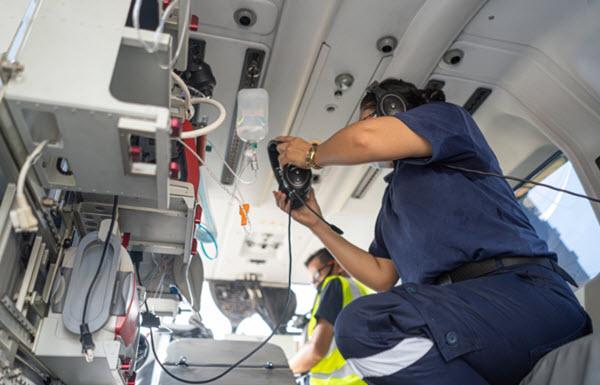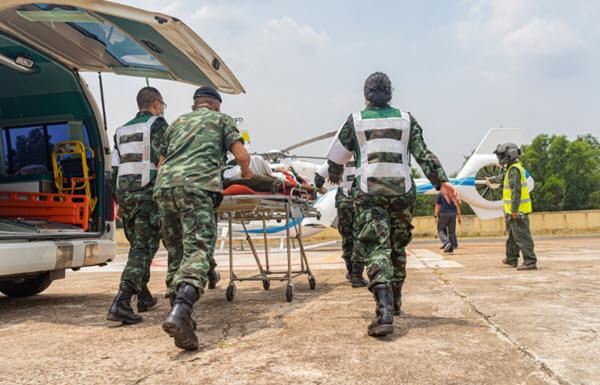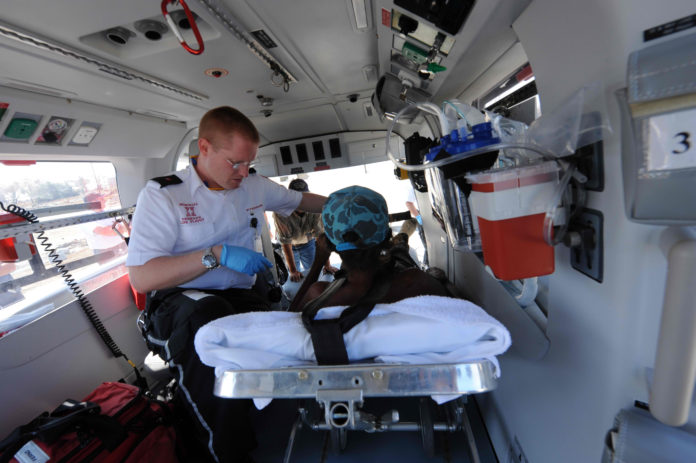Flight nursing is an exhilarating and rewarding career path that combines the challenges of critical care nursing with the unique demands of providing medical care during air transport. Whether you are an aspiring nurse or a curious individual looking to understand the intricacies of this field, this ultimate guide to flight nursing is here to provide you with a comprehensive overview.
What Is Flight Nursing?
Flight nursing is a specialized branch of nursing that focuses on providing critical care and medical assistance to patients during air transport. It involves the safe and efficient transfer of patients by air, either through fixed-wing aircraft or rotor-wing (helicopter) ambulances.
Flight nurses work alongside a multidisciplinary team of healthcare professionals, including pilots, paramedics, and emergency medical technicians, to ensure the highest level of care for patients in transit.
The primary purpose of flight nursing is to stabilize and monitor patients who require urgent medical attention or need to be transferred to specialized healthcare facilities.
This can include patients with severe injuries, trauma cases, cardiac emergencies, respiratory distress, neurological conditions, or other critical medical needs.
What Does It Take to Be A Flight Nurse?

Qualifications and training play a crucial role in preparing individuals for a career in flight nursing. Aspiring flight nurses must acquire a solid educational foundation and obtain the necessary certifications to ensure they possess the specialized skills and knowledge required for this challenging role.
Nursing Degree and Licensure
To embark on a career in flight nursing, individuals must first obtain a nursing degree from an accredited nursing program. This typically involves completing a Bachelor of Science in Nursing (BSN) program, although some flight nursing positions may accept an Associate Degree in Nursing (ADN).
It is important to note that a BSN degree provides a broader knowledge base and better prepares nurses for advanced practice roles. Following the completion of a nursing program, aspiring flight nurses must pass the National Council Licensure Examination for Registered Nurses (NCLEX-RN) to become licensed as registered nurses (RNs).
Specialized Certifications
In addition to basic nursing education and licensure, flight nurses often pursue specialized certifications to enhance their knowledge and demonstrate their expertise in flight nursing. Some of the common certifications for flight nurses include:
Certified Flight Registered Nurse (CFRN): Offered by the Board of Certification for Emergency Nursing (BCEN), this certification validates a nurse’s knowledge and skills in critical care and emergency nursing specific to flight nursing.
Certified Transport Registered Nurse (CTRN): This certification, also offered by BCEN, focuses on validating a nurse’s expertise in medical transport across different modes, including air transport.
Flight Paramedic Certification (FP-C): While primarily designed for paramedics, flight nurses may also pursue this certification to expand their knowledge and skills in prehospital and flight medicine.
Physical and Mental Requirements
Flight nursing demands physical and mental stamina. Flight nurses should be in good physical health, as they may need to lift and maneuver heavy equipment or assist with patient transfers.
They should also possess excellent communication and critical thinking skills, as they must make quick decisions in high-stress situations. Additionally, flight nurses should have the ability to adapt to changing environments, work well in a team, and effectively manage their emotions and stress levels.
The 5-Step Guide on How to Become a Flight Nurse

The processes involved in acquiring a flight nurse certification may vary across different regions. Nevertheless, here are five basic steps that a candidate needs to take in order to become a full-fledged flight nurse:
Step 1: Earn a high school diploma
Just like in any field, a high school diploma or GED is inherent in earning a Nursing diploma. This is also a fine time to review if your skills and interests suit the Nursing profession. To increase your chances of entering a Nursing program, ensure that you maintain high grades and acquire all the necessary prerequisites.
Step 2: Finish a four-year Nursing program
A Bachelor’s degree in Nursing is required to become eligible to take the NCLEX-RN and become a registered nurse. During the course of your study, it is suggested that you specialize in Critical Care Nursing. Special emphasis must also be given in areas of acute mental health, midwifery, and pediatrics. Once completed, this program will give you the basic competencies required to become a flight nurse.
Step 3: Become a registered nurse (RN)
In order to become an RN, all Nursing graduates are required to take and pass the national licensing exam also known as NCLEX-RN. The questions are a bit tricky so make sure you review ahead. There are also available resources and reviewers you can purchase to increase your chances of passing the exam.
Step 4: Acquire relevant experience and advanced certifications.
Flight nursing is a delicate field where nurses usually deal with trauma patients. For this reason, most institutions require candidates to spend at least 2 to 5 years in critical care areas such as emergency rooms and intensive care units.
In addition to that, aspiring flight nurses are also suggested to take as much certifications as possible. These must be relevant to flight nursing practice and may include the following:
- Basic Life Support Certification
- Neonatal Resuscitation
- Advanced Cardiac Life Support
- Certified Emergency Nurse
- Critical Care Registered Nurse
- Trauma Life Support
- EMS Certification/Licence
- Pediatric Advanced Life Support
- CPR Certification
Some employers also require nurses to take the Trauma Nursing Core Course. This training program is designed to provide the nurse with the knowledge and skills needed to handle trauma patients.
Step 5: Apply for a flight nurse position
After acquiring the required number of experience and certifications, aspiring flight nurses can now explore different employment opportunities.
Most in-flight nurses are hired to work either in military facilities or commercial companies. Different institutions may request for specific requirements/certifications so make sure you contact your potential employer beforehand to avoid any inconvenience.
Salary and Career Outlook
As a result, flight nurses often receive competitive salaries that reflect their expertise and the demands of their profession. The salary of a flight nurse can vary based on factors such as experience, location, employer, and additional certifications held.
According to the U.S. Bureau of Labor Statistics (BLS), the median annual wage for registered nurses, including flight nurses, was $75,330 as of May 2021. However, it is important to note that flight nursing salaries can significantly exceed this median figure due to the specialized nature of the job and the additional responsibilities involved.
Career Outlook
The career outlook for flight nursing is generally positive, with opportunities available in various healthcare settings. The demand for flight nurses is driven by the need for critical care during air medical transport, particularly in rural or remote areas where timely access to specialized healthcare facilities is limited. Additionally, flight nurses are crucial in responding to emergencies and providing rapid transport for critically ill or injured patients.
The employment prospects for flight nurses can vary by region and organization. Opportunities for flight nursing may be found in air ambulance services, government agencies, military operations, and private companies specializing in medical transport. Nonprofit organizations and search and rescue teams may also hire flight nurses.
Continuing advancements in healthcare technology, an aging population, and an increased focus on delivering specialized care to patients in need further contribute to the demand for flight nurses. However, due to the highly specialized nature of the field, positions in flight nursing may be competitive, and employers often require a certain level of experience and additional certifications.
To enhance career prospects and remain competitive in the field, flight nurses can pursue further education, acquire additional certifications, and gain experience in critical care and emergency nursing settings. Engaging in professional networking and staying updated with industry trends can also provide valuable opportunities for career advancement.
Sources:
Air & Surface Transport Nurses Association
International Association of Flight and Critical Care Paramedics


















